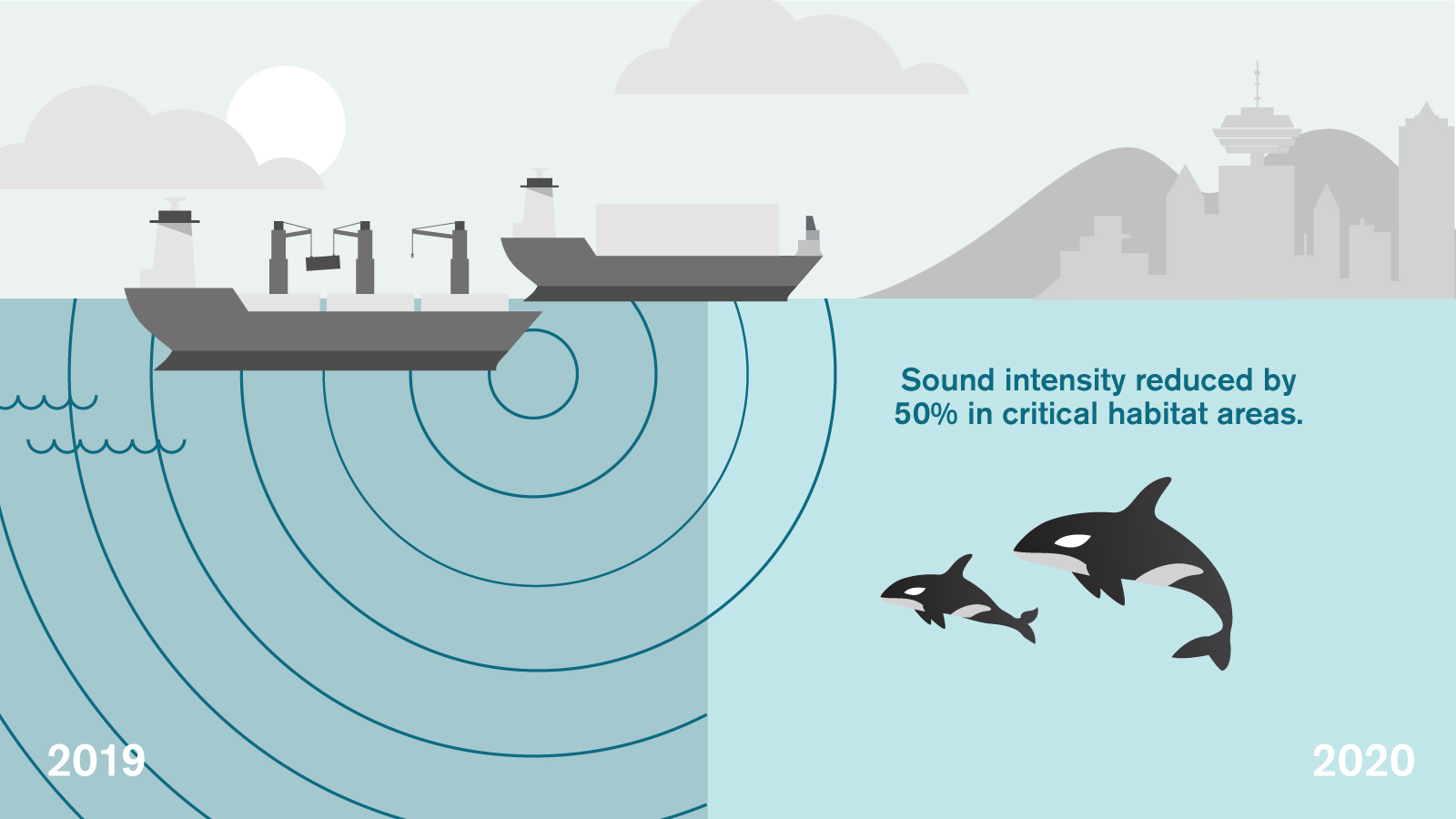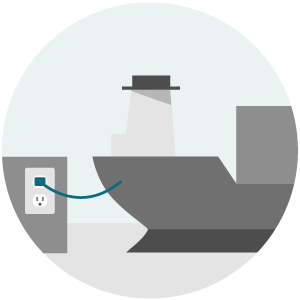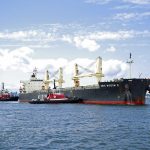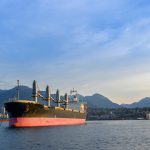Our commitment to facilitating trade sustainably
Environmental stewardship is central to delivering on the Vancouver Fraser Port Authority’s federal mandate to enable Canada’s trade sustainably, and our broader vision to make the Port of Vancouver the world’s most sustainable port.
Our commitment to facilitating trade sustainably
Environmental stewardship is central to delivering on the Vancouver Fraser Port Authority’s federal mandate to enable Canada’s trade sustainably, and our broader vision to make the Port of Vancouver the world’s most sustainable port.
As stewards of Canada’s largest port, we believe we have a leadership role to play in helping Canada achieve its climate commitments, while protecting the competitiveness of our port and the economic prosperity it delivers to our communities.
With our team of over a dozen dedicated environmental specialists with expertise spanning across air quality, atmospheric science, water quality, and more, we lead a variety of environmental programs and initiatives focused on advancing climate action, leading through environmental best practices, and maintaining healthy ecosystems.
Collaborating with industry to protect endangered species
Through our internationally-recognized Enhancing Cetacean Habitat and Observation (ECHO) Program, we are working collaboratively with government, the marine transportation industry, environmental groups and Indigenous advisors to reduce the cumulative impacts of commercial shipping on the endangered southern resident killer whale population.
Toward this goal, the port authority-led ECHO Program coordinates yearly voluntary initiatives encouraging marine vessels to reduce their speeds or stay at a distance within key southern resident killer whale habitat areas identified by Fisheries and Oceans Canada.
Last year, thanks to the voluntary participation of over 2,800 marine vessels—or 80% of all large commercial vessels — we helped reduce sound intensity by nearly 50% in southern resident killer whale critical habitat areas along BC’s southern coast.

The strong participation of the ECHO Program’s many partners and advisors during a year of tremendous uncertainty illustrates their continued dedication to this important effort to support the recovery of the endangered SRKW population.
We look forward to continuing to work collaboratively with our regional, national and international advisors and partners toward cleaner and quieter oceans in Canada and beyond.
Working together to help Canada reach net-zero by 2050
Through our climate action initiatives, we work with industry, government, and port users to implement initiatives that help improve air quality, reduce greenhouse gas emissions and encourage environmental best practices by port users.
Together with the ports of Seattle, Tacoma, and the Northwest Seaport Alliance, we are committed to the goal of phasing out all emissions from port-related activities by 2050, as outlined in the Northwest Ports Clean Air Strategy.
We are advancing the transition from fossil fuels to cleaner, lower-emission fuels and technologies through three key pathways:
• Phasing out of old, high-emitting equipment and supporting lower emission fuels
• Advancing the commercialization of zero-emissions equipment and adoption
• Addressing infrastructure constraints to the adoption of zero-emissions technologies
The path to Canada’s clean energy trade future
To realize our vision of making the Port of Vancouver the world’s most sustainable port, we rely on a broad range of industry, government, and port partners and stakeholders. Working together, we’ve created a number of programs and initiatives to help reduce the impacts of port activity on the environment and surrounding communities, while efficiently and safely facilitating trade through the Port of Vancouver.
Towards reducing emissions, we have set targets for each kind of emission source at the port — from ocean-going ships and harbour boats, to cargo-handling equipment, container trucks, locomotives and even our own administrative operations. Key programs and initiatives that make up our approach to encouraging cleaner trade at the Port of Vancouver include:
Incentivizing cleaner and quieter vessels
 |
EcoAction program Since 2009, the port authority has encouraged cleaner and quieter vessels to call at the Port of Vancouver by providing financial incentives for vessel operators that use lower emission fuels and technologies on their ships. Through the EcoAction Program, over 700 vessels that called the Port of Vancouver last year were rewarded for taking measures to reduce their emissions, lower underwater noise, or mitigate other environmental impacts. |
Helping tenants conserve energy
 |
Energy Action initiative Since 2013, the port authority has worked with the province’s electric utility provider, BC Hydro to link port tenants with financial incentives for reducing their energy consumption and acquiring more energy-efficient equipment. To date, the Energy Action initiative has helped provide millions of dollars in utility incentives for tenants at the Port of Vancouver, resulting in gigawatt-hours of energy savings. |
Promoting the phase-out of high-emitting diesel equipment
 |
Non-Road Diesel Emissions program We promote the phase out of older, high-emitting diesel equipment though the Non-Road Diesel Emissions (NRDE) program. We apply fees for usage of older engines and issue up to an 80% rebate of those fees when tenants replace, upgrade, or retrofit older equipment. Since 2015, the NRDE program has helped accelerate the retirement of old diesel equipment and encouraged the transition to new, Tier 4 engines that reduce particulate matter emissions by 90%. |
Reducing carbon emissions from port authority operations
 |
In 2020, the port authority established a GHG reduction target for its own operations of 40% by 2030, relative to 2010, and to become net zero by 2050. Since 2010, the port authority has procured high quality carbon offsets to neutralize carbon emissions from its corporate operations including the corporate office, fleet of passenger vehicles, air travel, and fleet of harbour patrol vessels. |
To learn more about the Vancouver Fraser Port Authority’s approach to environmental stewardship and how we are working to make the Port of Vancouver the world’s most sustainable port, visit www.portvancouver.com/ environmental-protection-at-the-port-of-vancouver.
Share this:




